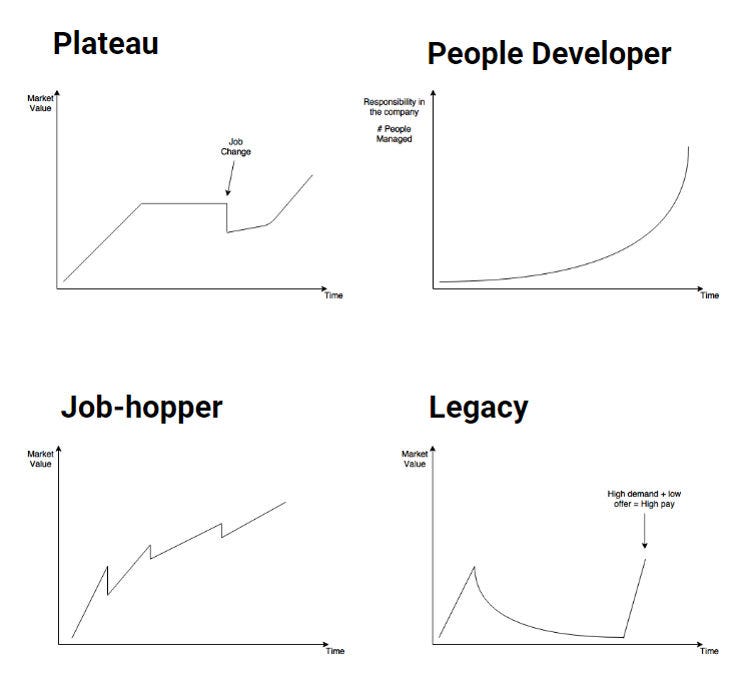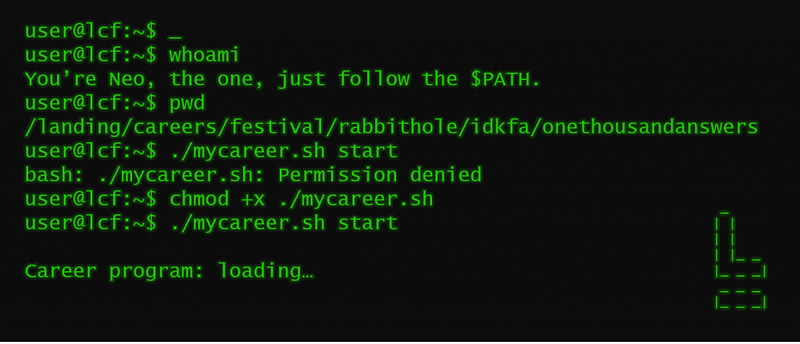Most of us don’t have a 10-year plan. Heck, why the hell would you need one in the first place? There’s not a single soul (or machine) on this earth that could accurately predict what the job market will be 10 years from now. That doesn’t mean we shouldn’t plan ahead. Planning ahead allows us to assess risks and opportunities, adapt faster and more intelligently. For our plans to work we need to stop thinking on the immediate next step, our next job, and instead focus on acquiring the right skill set that will allow us to navigate the tech jobs of tomorrow.
We’re all on a journey and as long as we’re moving forward there’s nothing to be ashamed of. Life is nothing more than a sequence of choices. So what is there to regret? You are the person you chose to be.
Are you thinking that you might regret having accepted your last job offer?
Or not having sold yourself better at your last interview?
Do you feel bored, frustrated, and tired of what you’re doing right now?
Does the idea that some time soon you’ll have to dive head first into the job market scares the hell out of you?
$ Do you think that’s air you’re breathing now?
If you haven’t looked for a job in a while your CV probably hasn’t been dusted off in a couple of years! Your portfolio is outdated — after all you’ve been spending your time becoming remarkable at your current job.
Let us shed some light on some of the most common tech career paths:
- Plateau. A tech professional whose market value is lower than the value he currently holds at his company. They don’t have a career plan and when the change arises they’ll need to take one step back in order to give two forward.
- People Developer. A tech professional with the goal of reaching a C-level position. They are highly motivated with goals in mind to find a sense of achievement and lead people.
- Job-hopper. A savvy tech professional that is always eager to grow his/her knowledge and try out new technologies. They are problem-solving driven and they love starting new projects but not so much maintaining them.
- Legacy. A tech professional that learned and focused on a legacy language (e.g. COBOL). These systems require high maintenance and very few new feature development. Their main motivation is mostly money. If the winds are blowing their way, the odds are in their favour, until suddenly they run out of luck.

Sounds familiar to you? Déjà vu perhaps?
Hopefully you’re not stuck in a Plateau or in a Legacy technology that you despise. There’s nothing wrong with that but you must be prepared for what is yet to come.
You need to wake up.
You need to be in the driver’s seat.
You need to make up the time to be up to date.
You need to develop the mental fortitude to keep pushing, keep studying, keep growing.
You need to understand that in order to stay competitive in this market, you need to be at the top of your game.
Forget that sometimes those fancy job descriptions you read make you think you’d need to be a Neo-like Deus Ex Machina who can skillfully master more than 10 distinct frameworks and languages! That’s just rubbish, but…
You still need to persevere!
You still need to believe in your skill set and your ability to deliver great work.
You know kung fu! You can learn to master the art just like the great tech professional you are.
In your earlier career days, you have relatively few responsibilities and obligations. Yes, of course, you have bills to pay, but many of us don’t have spouses and children (and dogs, and aging parents, and sports weekends, and baby showers, and…) to factor in when it comes to taking a big career gamble, or making a career shift, or working 60-hour weeks, or making other lofty sacrifices. We’re not telling you to go crazy and be reckless or ridiculous here. Be thoughtful, for sure. But these are absolutely great years to be a risk-taker with your career. It could really pay off in the years to come.
$ Buckle your seatbelt, Dorothy, ’cause Kansas is going bye-bye.

> Continue down the rabbit hole? [get on the driver’s seat]
> Rollback to previous post? [migrate to “my career”]






0 Comments